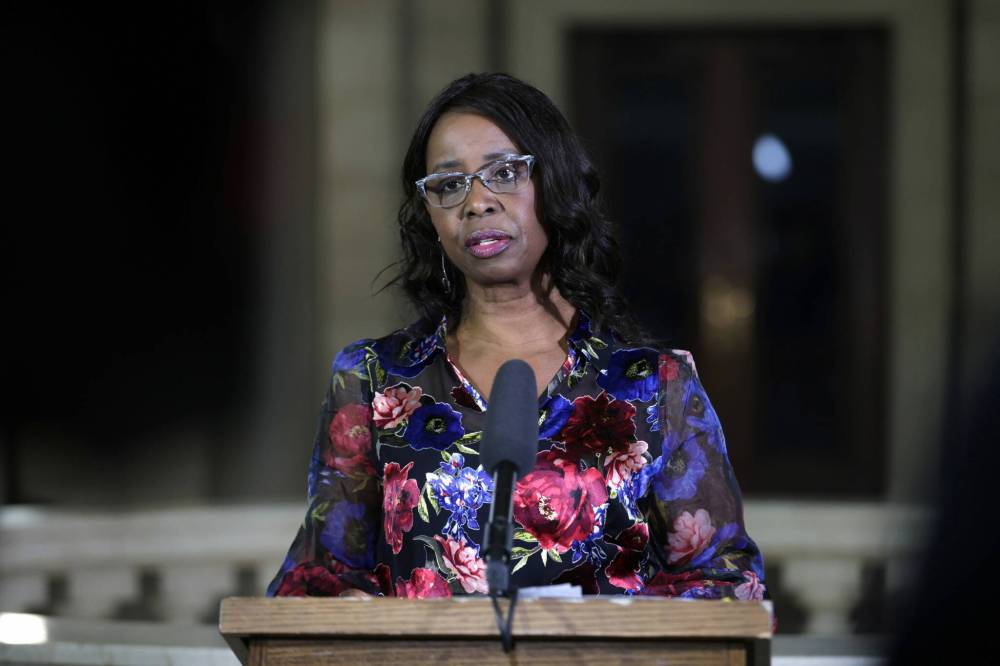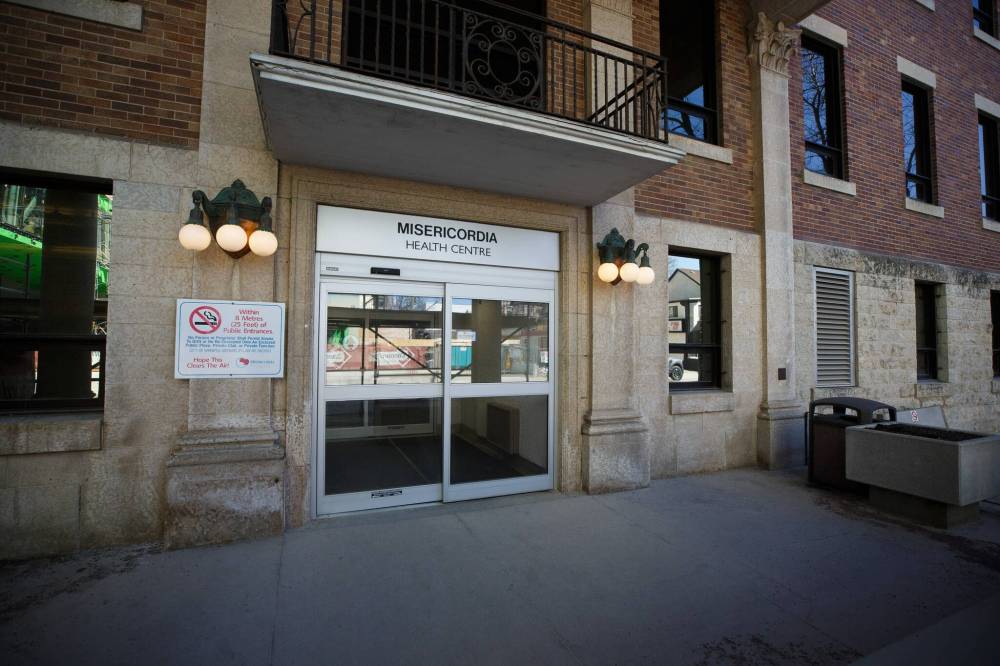Doctors decry province’s lack of transparency, tactics Health minister’s bid to undermine MDs critical of wait-list task force a problem, say sleep-disorder specialists who left panel
Read this article for free:
or
Already have an account? Log in here »
To continue reading, please subscribe:
Monthly Digital Subscription
$0 for the first 4 weeks*
- Enjoy unlimited reading on winnipegfreepress.com
- Read the E-Edition, our digital replica newspaper
- Access News Break, our award-winning app
- Play interactive puzzles
*No charge for 4 weeks then price increases to the regular rate of $19.00 plus GST every four weeks. Offer available to new and qualified returning subscribers only. Cancel any time.
Monthly Digital Subscription
$4.75/week*
- Enjoy unlimited reading on winnipegfreepress.com
- Read the E-Edition, our digital replica newspaper
- Access News Break, our award-winning app
- Play interactive puzzles
*Billed as $19 plus GST every four weeks. Cancel any time.
To continue reading, please subscribe:
Add Free Press access to your Brandon Sun subscription for only an additional
$1 for the first 4 weeks*
*Your next subscription payment will increase by $1.00 and you will be charged $16.99 plus GST for four weeks. After four weeks, your payment will increase to $23.99 plus GST every four weeks.
Read unlimited articles for free today:
or
Already have an account? Log in here »
Hey there, time traveller!
This article was published 20/04/2023 (959 days ago), so information in it may no longer be current.
Two Manitoba doctors say the government is trying to discredit them after they spoke out against the province’s diagnostic and surgical task force over their concerns it is prioritizing privatization over patient care.
The two respirologists, Dr. Eleni Giannouli, medical director of Misericordia’s Sleep Disorder Centre, and Dr. Nancy Porhownik, co-section head of respirology in the University of Manitoba’s department of medicine, both described the Progressive Conservative government’s response this week as an attempt to disparage them.
“That was anticipated,” Giannouli said.

“Doctors do not have it easy,” she continued, adding physicians should be able to speak up to advocate for patients and themselves.
“It’s a problem.”
She described a lack of transparency in health-care decisions made under the provincial government.
After the two sleep-disorder specialists spoke publicly about their decision to resign from the task force created to address mounting pandemic backlogs in the health-care system, the government doubled down on claims the pair were not official members.
The doctors say the government’s reaction is an attempt to undermine them. The Free Press has obtained a copy of a government email that attached a non-disclosure agreement and extended “a welcome to the Diagnostic and Surgical Recovery Task Force.”
It’s simply not true they weren’t part of the task force, Porhownik said, adding patients and other doctors are reaching out to thank her since she spoke publicly.
“The immense number of calls, texts and emails from other physicians has been validating. Many express that they too feel they have been ‘strung along’ and disregarded with these task force proposals. There are layers and layers of ‘due diligence’ required of public proposals, and yet private contracts are signed without an impact analysis on services, a plan of care for patients, or an unbiased look at the quality of services paid for in the private companies,” Porhownik wrote in an email Thursday.
“What has been most validating for me is the response of patients who are thanking me for speaking up.”
On Wednesday, Health Minister Audrey Gordon publicly stated Giannouli and Porhownik weren’t members of the task force or its steering committee. The previous day, the minister’s office said “the two doctors were not part of the task force and stating anything to the contrary is false,” describing them instead as “advisers.”

The doctors say they never claimed to be members of the steering committee, but they were involved in meetings to provide input for its work and served on a sleep-medicine subcommittee for task force projects.
They were welcomed to the task force, required to sign non-disclosure agreements to be part of it and, when they decided to resign earlier this month, their departures were acknowledged by the panel’s executive director and steering committee chairman.
The two respirologists were focused on securing additional funding, staffing and updated equipment for the Misericordia lab, but they said their funding proposal was ignored as the task force instead prioritized pursuing private contracts.
The task force was formed in December 2021 to deal with the fact that thousands of Manitobans were on years-long wait-lists for surgeries and other diagnostic tests during the COVID-19 pandemic. Sleep apnea diagnosis in Manitoba was one of the medical services that already had long wait-lists prior to the pandemic. The number of patients waiting doubled when COVID hit and the only public sleep lab in the province had to temporarily shut down.
There are about 6,600 patients still on the wait-list and the lab has the capacity to see 600 patients every month, but lab leaders say the facility is working with outdated equipment and continues to lose staff, particularly polysomnography (sleep study) technicians, some who left to join the private sector. With several thousand Manitobans waiting for sleep-disorder tests and a growing wait time that would take years to eliminate, Giannouli and Porhownik both told the Free Press they understood the need to work with private partners to tackle long backlogs.
But they said their questions about plans for follow-up care were also ignored, despite their concerns that patients who pursued private sleep studies would only wind up waiting again for treatment at the Misericordia lab. Written correspondence between the clinic and the task force leaders indicate the panel was relying on the lab to supply patient information so people on the wait list could be contacted for private studies.
The lab didn’t want to give out patient information without getting assurances about additional public resources, along with concerns about privacy-law breaches.

“We simply lack the manpower to add any additional patients to our clinics,” a letter from Giannouli and Porhownik to the task force stated in January, indicating they were concerned, after months of discussions, about how they would treat and prescribe to patients who had been evaluated elsewhere.
In response, on Jan. 19, the task force stated privacy regulations would be followed and acknowledged a need for more public resources during its agreement with Cerebra, a Manitoba-based company, to complete 1,000 sleep studies. The task force stated Cerebra would contact patients, arrange for sleep studies and send the data to be interpreted “by qualified sleep experts in Ontario.”
Cerebra has since said these experts are all board-certified in Manitoba even if they are based out of province. The analyzed results would be sent back to the Sleep Disorder Centre, and if any ongoing care was required, the task force promised to work with the Winnipeg Regional Health Authority and the sleep lab to identify any additional resources needed.
In the letter, the task force stated “we recognize that (the sleep disorder centre lab) may require additional resources associated with this program,” and that the lab’s funding proposal was still under review.
katie.may@winnipegfreepress.com

Katie May is a multimedia producer for the Free Press.
Our newsroom depends on a growing audience of readers to power our journalism. If you are not a paid reader, please consider becoming a subscriber.
Our newsroom depends on its audience of readers to power our journalism. Thank you for your support.











